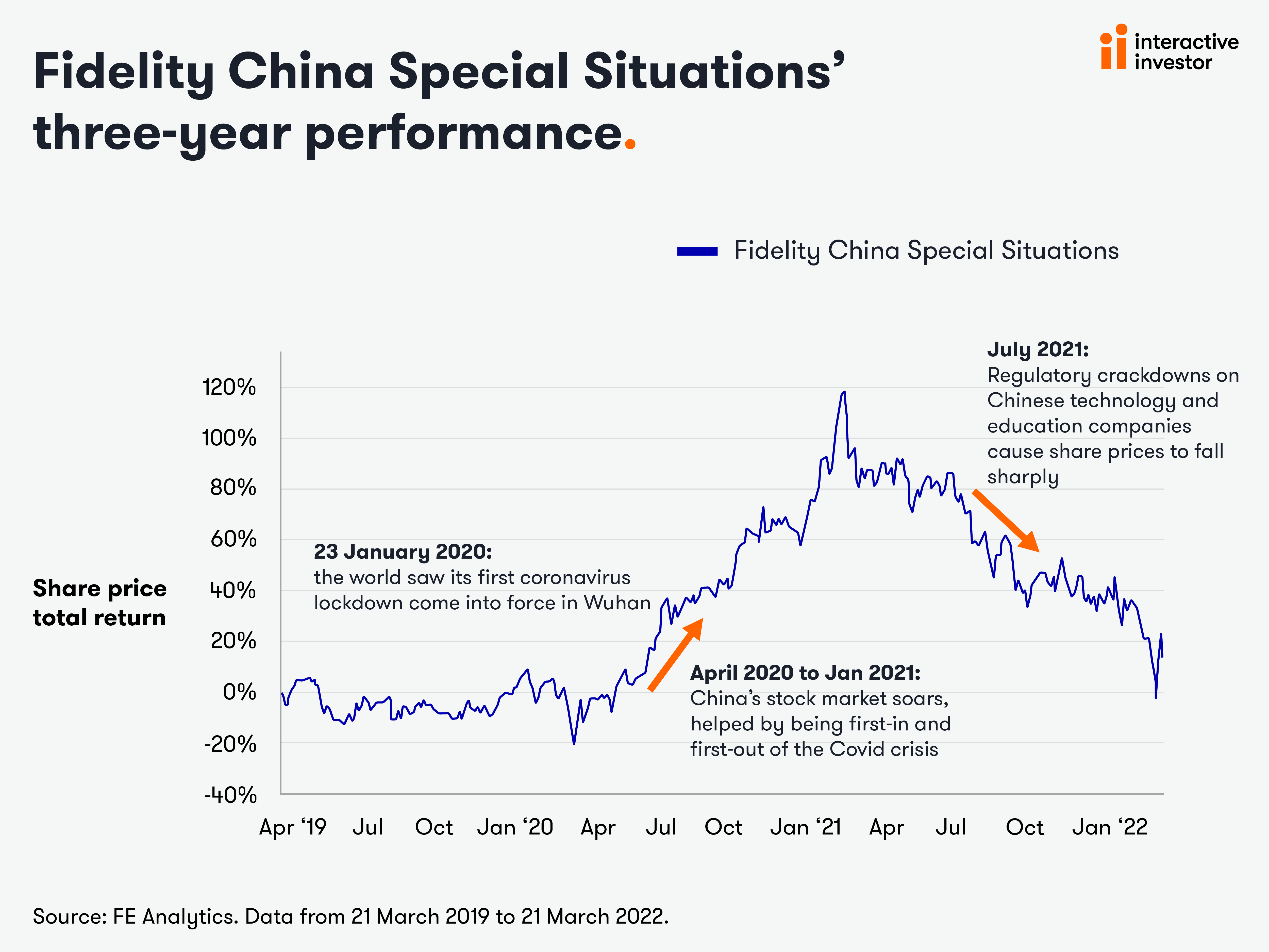Investing in China: buying opportunity or not worth the risk?
5th April 2022 10:29
by Ceri Jones from interactive investor
Does the political risk of investing in China now outweigh the potential rewards? Ceri Jones reports.

Investment in China has been hit by policy tightening and stringent regulation in a number of sectors, notably technology and property. The unexpected move by China’s government sent the share prices of various tech and education companies sharply lower, including Tencent (SEHK:700) and Alibaba (NYSE:BABA).
Following the regulatory changes, which threaten the future earnings and profitability of companies in those sectors, some investors threw the towel in on the grounds that the political risk of investing in China now outweighs the rewards.
- Explore our: Buy Global Funds | Buy International Shares | Transferring an Investment Account
The Shanghai Stock Exchange Composite Index chart has been volatile but at current levels, it is only down 4% over the past year. The £1.8 billion Fidelity China Special Situations Trust, which has gearing of 29%, has lost nearly 40% over the year.
- Ian Cowie: China is cheap, but I prefer India and Vietnam
- Why I’d still buy Chinese stocks despite crackdowns
- Three pros on why China’s political risk is a price worth paying
However, there are reasons to be optimistic, points out Dale Nicholls, portfolio manager of Fidelity China Special Situations (LSE:FCSS) investment trust, which is a member of interactive investor’s Super 60 list. According to Nicholls, we are probably past the peak of regulatory reforms, particularly in tech, a sector which after all has been under the microscope globally because of its growing influence, and related challenges around anti-trust, data security and privacy.
He says: “For some businesses, the environment has become more challenging. Still it is important to keep a long-term perspective and to remember that we have seen periods of tightening regulation before, such as government-imposed restrictions around online gaming in 2018.
“There is a good chance we are well into, if not past the peak of regulatory reforms, particularly within the technology sector - I would not expect the same degree of intensity that we saw last year and at the end of 2020 to continue.”
Three reasons to be bullish
Putting potential political risk aside, there are three reasons to be bullish: China’s diverging monetary policy, the inflationary backdrop, and the potential resurgence in value stocks and away from growth stocks.
However, there is also one terrifying potential risk – that China will align itself more closely with Russia, position its economy to be less dependent on the US, and even be emboldened to attack Taiwan.
First, monetary policy, which in China is currently at a very different stage to that in the US and Europe. A tilt towards easing typically supports markets, and in January the borrowing rate of medium-term loans was cut for the first time since April 2020.
China may also find it easier to shrug off accelerating global inflation. Yifan Hu, head of macroeconomics for Asia Pacific at UBS, says that while China is the world’s largest crude oil importer, the impact on economic growth will be marginal. Hu further points out that even though the price of imported agricultural goods will also rocket, the increase in consumer prices would not be so great as to deter the People’s Bank from easing.
“The same cannot be said about other markets, especially the smaller, open economies that are more sensitive to changes in crude prices,” Hu says.

Third, Chinese stocks are on affordable valuations. Kiran Nandra, head of emerging markets at Pictet Asset Management, notes: “With valuations around 11x price to earnings, we believe the market remains undervalued with specific areas of growth likely to encompass areas such as industrial internet, renewables as well as local brands.”
Before the invasion of Ukraine, most global markets saw a rotation out of ‘expensive’ growth stocks. Cyclical sectors such as durable consumer goods and services should benefit as pandemic restrictions are lifted and monetary policy loosened.
“Diversification and valuations are as important as ever,” says Nicholls. “I am excited that China currently ticks both boxes.”
He adds: “It clearly has been a volatile period, but history teaches us that these are usually the periods that offer the most attractive opportunities. Corporate earnings for the market are forecast to grow over 15% for the next 12 months, and the portfolio should grow well above this level.
“Meanwhile, the market overall is trading on a price earning multiple that is attractive relative to history and relative to other stock markets globally.”
Nicholls says the trust continues to have a large exposure to companies focused on growing domestic consumption and areas such as healthcare, that are supported by the growing middle classes.

Drivers for growth remain in place and fund ideas
The managers of the Baillie Gifford China fund also point out that the drivers for long-term growth are still intact, namely China’s continued urbanisation, consumption upgrade and reform, and rapid development in innovation and technology. China’s Generation Z+ consumers, who have grown up with access to the internet and portable digital technology from a young age, and number some 450 million, are expected to be the major driving force of this consumption upgrade.
“Yet, the attractions “needs to be carefully balanced with concerns about the role of the state, the direction and speed of regulatory change, and overarching geopolitical and ideological concerns, “ says the fund’s manager Mike Gush.
There are compelling reasons to invest in China if you have the risk appetite. For example, if you believe in an eventual return to the status quo, KraneShares MSCI China ESG Leaders ETF (LSE:KESG) tracks Chinese companies with high environmental, social and governance (ESG) ratings relative to their sector peers.
- Ian Cowie: no regrets about selling my China investment trusts
- Funds and investment trusts with the punchiest portfolios
- Are Scottish Mortgage’s private holdings overvalued?
In any event, investors need to disaggregate emerging markets as a single category and focus on specific regions in the same way that Japan is now thought of separately from the rest of Asia.
For diversification purposes, the A-share market is important as it reflects the confidence of the Chinese people themselves. “This is an asset class that marches to its own drumbeat, with a very different investor base to the rest of the market and that has historically been relatively insulated during times of geopolitical risk and uncertainty,” says Nandra.
The popular emerging market indices do not give the A-share market an appropriate weight. The MSCI Emerging Markets Index, for example, only provides investors with a 5% exposure to the A-share market.
For those who want exposure to emerging markets without China, be aware that Taiwan is likely to feature heavily in the remaining mix. For example, the iShares MSCI Emerging Markets ex-China ETF has been attracting huge inflows since the regulatory tightening was speeded up last summer, but 24% of the index is in Taiwan.
Pacific Assets (LSE:PAC) has only 9% in China and has skilfully navigated China tech, but it has 11% in Taiwan. Its largest allocation – just under half the portfolio – is in India.
Jupiter multi-manager funds sold out of China
Some asset managers pulled back from China, even before the geopolitical situation worsened. Jupiter Merlin Portfolio, a multi-manager fund range, redeemed its positions in Asian equity strategies last year to exit direct Chinese equity exposure.
David Lewis, co-head of strategy for independent funds at Jupiter Asset Management, says the firm had been discussing and monitoring its Chinese exposures as political tensions rose between China and the West for the last few years.
“Then, during the first half of 2021 we observed the crackdowns by the Chinese Communist Party on various industries including private education,” Lewis says. “We came to the conclusion that as China looked to move in a more authoritarian direction and companies in China would have to increasingly take decisions favourable to the Chinese government, that the interests of Western, minority shareholders, like ourselves, were likely well down the list of priorities for Chinese management teams.”
The invasion of Ukraine has underlined the West’s complacency and the strategic importance of access to cheap energy and mineral resources. But it has also reminded us, says Lewis, “that investing in contentious areas can result in one relearning the vital lesson that investment is not only about the return on capital but also the return of capital which can be blocked when the shutters come down”.
These articles are provided for information purposes only. Occasionally, an opinion about whether to buy or sell a specific investment may be provided by third parties. The content is not intended to be a personal recommendation to buy or sell any financial instrument or product, or to adopt any investment strategy as it is not provided based on an assessment of your investing knowledge and experience, your financial situation or your investment objectives. The value of your investments, and the income derived from them, may go down as well as up. You may not get back all the money that you invest. The investments referred to in this article may not be suitable for all investors, and if in doubt, an investor should seek advice from a qualified investment adviser.
Full performance can be found on the company or index summary page on the interactive investor website. Simply click on the company's or index name highlighted in the article.